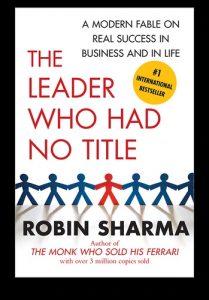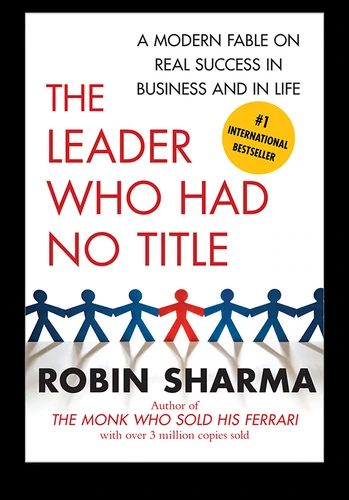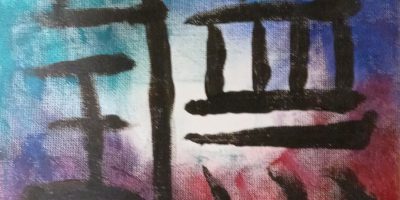A Book Review
With the intention of now writing book reviews once in awhile for books that really moved me in some capacity, here is my first conscious book review. This book is The Leader Who Had No Title, by Robin Sharma. It is written in the fiction format, but is full of what can only be considered non-fiction. The book is written for an American audience so it seems by the way the main character is a war vet of the Iraq war. I will quickly deal with the one potential criticism of the book, other than its’ kind of corny sound at times in the dialogues. It did grow on you though as you continued getting to know the main characters. The other thing is that for a moment I thought it might have had a pro war stance. There was a constant acknowledgement of the United States being in wars, and the expression of appreciation to the soldiers who have served time for the American military. Especially the Iraq war, but the good thing about this was that it was done with taste, and there was some honest dialogue and feelings around how the soldiers in the war are psychically damaged as much and more than physically damaged; and that there is a sense of just being tossed to the side, “thanks we are done with you now”, by the government after being used in the war movements. This wrong treatment was from the leaders and systems that run the country, and was not the same sentiment of the public people though. In the book, everyone thanked the main character for serving in the war, and acknowledged the sacrifices, pain and trauma that people have suffered in the wars.
The main character was from the Iraq war, and was feeling pretty down about himself and his life. Things were going from great, before his war time, to terrible during the war, and to worse after his time serving in the Iraq war as he settled back into civilian life of the United States. A mysterious man walks into his work at the bookstore and creates a connection and mentorship that was intense, life changing and short. He took him to four other teachers, who were also people who understood and lived the life of a leader without a title. Each teacher takes Blake, the main character, through a lesson, and an acronym that can be used as a guide to master that aspect of leading without a title.
The content of the book is amazing, and worth reading if just for that. There are summaries too after each chapter, and many tools, exercises and more offered to help the reader incorporate these practices and beliefs into their life. For example each character gave a main theme or point to leading without a title. The first was a beautiful spanish woman working as a maid in an expensive hotel, taught about doing your best in all that you do. The second, who was an ex-pro athlete in skiing, talked about the fact that hard times make a good leader, and to be strong, courageous and bold. The third person was an ex-CEO in some big company who taught Blake that relationships are very important in having a successful life; success in both business and personal is based upon the quality of relationships that you nurture. The last person, a massage therapist, explained how to be a good leader for others, because leadership implies others, you first have to be able to lead yourself. You are the most important part of the whole system, in that you need to be your very best to lead without a title, because you lead with character, loyalty and respect, not titles. Improve yourself, not others, critic yourself, not your team, be the person that you want others in your organization to be.
The details are great, and I encourage each of you to find and read this book, or, as I do, listen to the audio CD in your car while you are driving around town. It was while I was driving around listening to it that I saw a larger trend in culture of the modern information age. This book is an example of this trend, which to put it succinctly: there is a growing tendency towards excellence and reaching for that real human potential, which is infinite.
This is a deep thought, one that can not really be captured in this short review, but I desire to give a small taste. Again, credit for this passion to write about social movement, and evolution of humanity goes to the book, The Leader Who Had No Title; it could be understood as the info-bit that pushed me into critical mass. We are a species who is conscious of the infinite, though living in finite bodies. We are bound by the physical matter you identity with, and we have tended to identify with only the body you feel connected with. This is an ego dominated consciousness, and we live in that.
Still we are aware of divine reality through concepts like forever, infinity, even all tends towards the endless. As we become more aware of the infinite, our capacity to create from the infinite potential of pure consciousness increases. This is resulting in society changing in ways that are understood best as metamorphic, transitional and quantum. This change is not coming from the leaders, it is not coming from the masses nor the powers that be. They are actually clinging onto the past, there is a growing desperation among the unevolving, and the reaction of tightening the grip on culture, people and change. This is, of course, resulting in stagnation, calcification and atrophication of society and humanity, which created the social reality we live in.
This is okay too, because as a butterfly sluffs off its old useless cocoon, so too will evolving humanity sluff off the rigid, dead old self. Titles are a part of this old consciousness, they represent ego’s need to control and be known. The same in relationships, we create stability and form with our roles and the names used for the various relationships we hold: boyfriend, girlfriend, husband, wife, marriage, fiance, lover, partner, friend or ex. There are categories of relationships too, like, business, family or stranger. Their use in inter-connections is understood, and with that awareness we can transcend their confining nature, and use the titles and names we have for the different relationships we have to enhance the purpose of that particular relationship. Their separating nature is transcended, and our unity is lived, not sought.
Unity is the new awareness that is taking humanity out of the ego and into the mind. This is a tricky statement, but it is meant to show the difference between ego and mind. Ego is the personal, historical creation of a single person. MInd is the collective and historical manifestation of a society of people. Unity is of the mind, and as we seek unity we move from ego into mind. Unity teaches us that we are one, that this oneness goes as far out as you are willing to expand your ego: self, family, community, nation, race, species, life.
As I read this book I saw this coming into reality. The idea that people could let go of their need to have a title, the way that spoke of ego expansion, the necessary changes in personality to be able to live like that, it necessitates the expansion of the ego, and the realization of mind. The ego does not die here, rather the ego is united with others, creating mind. There may be other names for this phenomena, and I am sure it has been witnessed already in different parts of the world. Today though, I want to call out this event, and try to help people everywhere understand it by subscribing a form to it, and calling it “the creation of mind from ego”.
Like what you read? Sign up for Chris’s monthly newsletter, the Wellness Cafe that explores the latest insights in psychology, spirituality, relationships and the journey of building an intentional community. Chris R. is a trans-personal psychology pioneer in mental health practices and alternative relationship coach. He lives and works in BC at the Wellness Cafe, a non-profit organization bringing high quality alternative mental health services to the public at affordable costs. Continue to conversation and find Chris on Telegram or Librti.com

The Leader Who Had No Title




